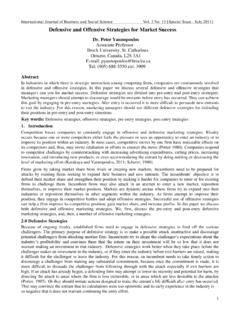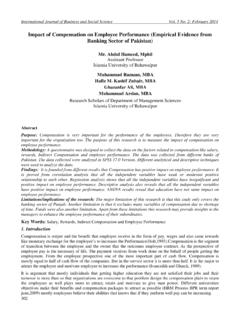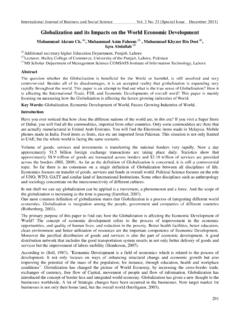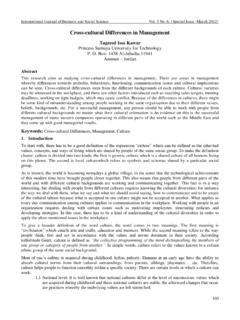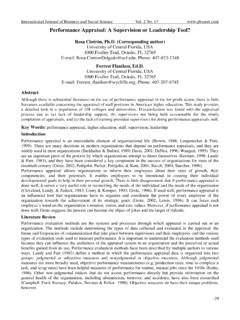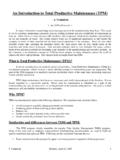Transcription of Factors affecting Effective Strategy …
1 International Journal of Business and Social Science Vol. 5, No. 9(1); August 2014. Factors affecting Effective Strategy implementation in a Service Industry: A Study of Electricity Distribution Companies in the Sultanate of Oman Dr. James Rajasekar Department of Management College of Economics and Political Science Sultan Qaboos University P O Box: 20 P C 123. Al Khoud Sultanate of Oman Abstract Successful Strategy implementation is a key for any organization's survival. Many organizations could not sustain their competitive advantages, despite having a robust Strategy formulation process, because they lack the processes in implementing the strategies. Considering the higher failure rates in implementation of strategies, more attention should be given by executives to implementing the Strategy . Several reasons are frequently offered for the failure of implementing Strategy . While this field of research attracted significant research interests and subsequently added quality theories and models in the western world, this topic has not attracted much attention in the Middle East region.
2 Hence, this study investigated the Strategy implementation processes followed in a service industry in the Sultanate of Oman. The study proposed seven Factors that affect implementation Strategy . The results demonstrate that leadership is by far the most important factor influencing successful implementation Strategy in the service sector. Introduction While many people believe that formulating an innovative and unique Strategy is critical and by itself sufficient to lead a firm to success in today's business world, ensuring that such a Strategy works is equally as important. Executives should pay careful attention to the implementation of strategies to avoid common pitfalls that result in failure. A number of approaches that greatly enhance the effectiveness of Strategy implementation can be employed. Indeed, good strategic management is a function of people actively considering Strategy as they make day-to-day decisions in an ever-changing world.
3 The Strategy literature claims that between 50% and 80% of Strategy implementation efforts fail (Ashkenas &. Francis, 2000; Beer & Nohria, 2000; Carlopio, 1998, 2003; Jonk & Ungerath, 2006; Raps, 2004; Atkinson, 2006). According to Bell, Dean, and Gottschalk (2010), Strategy execution is commonly the most complicated and time- consuming part of strategic management, while Strategy formulation is primarily an intellectual and creative act involving analysis and synthesis. Thus, it is important to study the properties of successful Strategy implementation . According to Cater and Pucko (2010), the implementation of strategies was a key driver of the emergence of strategic management in late 20th century. Egelhoff (1993) investigated whether organizations are looking for great Strategy or great Strategy implementation by analyzing Asian firms that have competed successfully by focusing on the implementation of not so distinctive strategies instead of attempting to develop unique strategies.
4 By comparing US and Japanese semiconductor industries, Egelhoff found that the frequent repositioning of American firms had a greater impact on other American companies and a lesser impact on Japanese firms that are busy implementing their long-term product line and market segment strategies. According to Zaribaf and Bayrami (2010), the majority of large organizations had problems with Strategy implementation . The literature supports the view that unlike Strategy formulation, Strategy implementation cannot be achieved by top management alone; it requires the collaboration of everyone inside the organization and, on many occasions, parties outside the organization. While formulating a Strategy is normally a top-down endeavor, implementing it requires simultaneous top-down, bottom-up, and across efforts. 169. Center for Promoting Ideas, USA Although numerous studies have defined organizational culture, measured its components/constructs, and associated it with components of organizational success and change (De Hoogh, den Hartog, Koopman, Thiery, van den Berg, van der Weide, & Wilderon, 2004; Mallinger, Goodwin,& O'Hara, 2009), very few have connected a reliable and predictive measure of organizational culture to implementation outcomes in the Gulf region.
5 Literature Review Strategy implementation is a connecting loop between formulation and control. Herbiniak (2006) argued that while Strategy formulation is difficult, making Strategy work and executing it is even more difficult. Similarly, Cater and Pucko (2010) concluded that while 80% of firms have the right strategies, only 14% have managed to implement them well. To determine the relationship between Strategy formulation and implementation , Egelhoff (1993) investigated when it is best for organizations to think about Strategy implementation : at the time of Strategy formulation or afterward. Another question of even more importance to an organization is whether it is more difficult to formulate Strategy than to implement it. In other words, should executives and organizations formulate innovative and perhaps unique Strategy that can offer a competitive advantage and then attempt to implement it or identify the organization's capability first and then formulate a workable and practical Strategy ?
6 For example, a well-formulated Strategy is meaningless if it is not implemented well. However, too much consideration of various aspects of implementation might result in formulating a Strategy that is not competitive and, therefore, implementing it would be a waste of time and resources. Echoing previous studies with similar results, Zaribaf and Bayrami (2010) found that most executives in organizations spend a great deal of time, energy, and money in formulating a Strategy , but do not provide sufficient input to implement it properly. Normally, companies change their Strategy to reposition themselves and adapt or react to market opportunities and threats; when considering how to implement a Strategy , most probably will constrain any creativity in the new Strategy . Therefore, one must strike a balance between an innovative and workable Strategy and its successful implementation . Several studies (Ashkenas & Francis, 2000; Beer & Nohria, 2000; Carlopio, 1998, 2003; Cater & Pucko, 2010).
7 Have emphasized the importance of formulating and implementing a Strategy , with higher importance given to Strategy formulation due to its criticality to the existence and expansion of the organization. However, implementing a Strategy is much more difficult than formulating it. The former requires leadership skills, precision planning, and organizing of resources and activities as well as ensuring people's commitment to the new Strategy , while the latter requires creativity and understanding the business and assessing the market opportunities and the firm's strengths. While Strategy formulation is usually a function of top management, its implementation is the responsibility of middle and lower level managers. However, the role of top management is vital in preparing a workable Strategy and communicating it clearly so that middle managers can more easily implement it. In other words, a successful implementation journey starts in the formulation stage and a failure to find that link between Strategy formulation and Strategy implementation is a step toward Strategy failure.
8 Strategy formulation is basically entrepreneurial in nature and requires a great deal of analysis, judgment, and innovation. However, implementation requires administrative and managerial talent and an ability to foresee obstacles that might arise in Strategy implementation . Factors affecting Strategy implementation The body of knowledge in this area is rich with surveys and industry-based studies. Factors that affect Strategy implementation can be categorized as leadership style, information availability and accuracy, uncertainty, organizational structure, organizational culture, human resources, and technology. Although most authors agree that these Factors affect Strategy implementation , each factor's impact is at a different level and carries a different force. Lorange (1998) stated that human resources are becoming the key focus of Strategy implementation and reiterated that people, not financial resources, are the key strategic resources in Strategy implementation .
9 In a study involving 172 Slovenian companies, Cater and Pucko (2010) demonstrated that managers mostly rely on planning and organizing activities when implementing strategies, while the biggest obstacle to Strategy implementation and execution is poor leadership. Their results showed that adapting the organizational structure to serve the execution of Strategy has a positive influence on performance. Fulmer (1990) mentioned that human resources management plays an important role in the Effective implementation of strategic plans. It is important for both organization departments and employees to be enthusiastic about the Strategy implementation . Getting people involved and having a motivating reward system will have a positive influence on the implementation of Strategy . 170. International Journal of Business and Social Science Vol. 5, No. 9(1); August 2014. In addition, technological advancement in terms of speedy processes and procedures, as well as design, will also make a positive contribution to the successful implementation of strategies.
10 The Role of Leadership in Strategy implementation According to Cater and Pucko (2010), while a well-formulated Strategy , a strong and Effective pool of skills, and human capital are extremely important resources for Strategy success, poor leadership is one of the main obstacles in successful Strategy implementation . Lorange (1998) argued that the chief executive officer (CEO) and top management must emphasize the various interfaces within the organization. One key challenge in successful Strategy implementation is ensuring employees' buy-in and directing their capabilities and business understanding toward the new Strategy . Therefore, the need for Effective leadership outweighs any other factor. Beer and Eisenstat (2000) addressed this issue from a different perspective; they suggested that in the absence of Effective leadership, conflicting priorities will result in poor coordination because employees will suspect that top management prefers to avoid potentially threatening and embarrassing circumstances.

